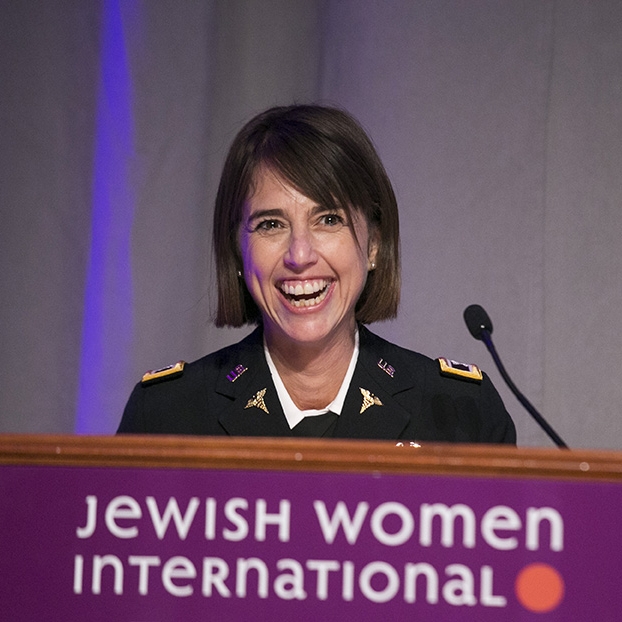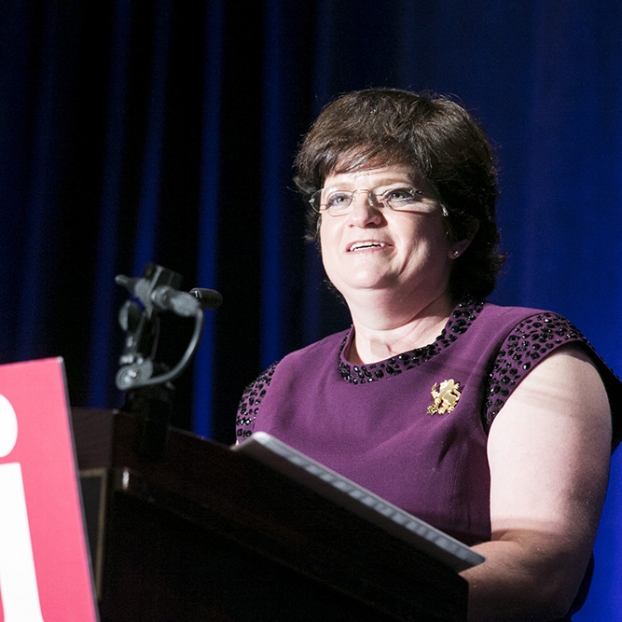A Century Later, SDT Continues to Empower Women
by Lauren Landau
For the past 15 years, JWI has found a friend in Sigma Delta Tau (SDT) Sorority. As a philanthropic partner of the Greek organization, JWI receives invaluable support and brings key programs to SDT chapters across the country.
JWI and SDT have more in common than may be immediately apparent. Not only did Jewish women found both organizations, but the two also share core values and—as of this year—are both over 100 years old.
Founded by seven Jewish young women on March 25, 1917, at Cornell University, SDT is celebrating its 100th birthday with a blowout centennial weekend planned June 23 through 25 in New York City. JWI leadership and staff will join sorority members and representatives at the festivities marking this milestone.
far left: SDT Immediate Past National President Michelle Carlson; second from right: SDT Past National President Beth Gruber; right: SDT National Vice President Tami Ackerman
SDT Past National President Beth Gruber, chairman of the centennial, says it’s exciting to envision the next century of sisterhood, but notes that it’s also important to reflect on the past and the sorority’s incredible history. “Thinking back to what it was like in 1917 to be a woman, very few were even in college,” she says. Denied access to other sororities, the founders of SDT took a bold move—they started their own.
“For these women to be trailblazers and to be so brave to go to the administration and petition and demand they have what everybody else had, to me is quite remarkable,” she says. “What started as this dream from seven women has grown to over 105 chapters across the country with thousands of sisters who have called SDT home.”
SDT alumna Dr. Bonnie Hartstein is a lieutenant colonel and chief of family and community medicine at San Antonio’s Brooke Army Medical Center. JWI honored her as a Woman to Watch in 2013. She says that, for her, a big part of the centennial celebration is reflecting on the sorority’s history and its roots as an organization born out of resistance to discrimination.
“It is especially important in this day and age to be sensitive to tolerance and to people of other backgrounds,” she says. “I am excited that SDT continues to grow and become more socially involved with the work the sorority does now to empower women and prevent violence.”
Dr. Hartstein is not the only SDT alumna named a Woman to Watch. In 2015, JWI honored Lynn Morgan with the award. She joined the sorority’s Alpha chapter at Cornell, and says women today can learn from the boldness exhibited by SDT’s founders. “It was very empowering to learn all about these seven young Jewish women who took a chance to start a new sorority at Cornell University,” she says. “Those are the kind of leadership skills that are very important for young women today. Don’t be afraid to fail. Taking reasonable risks is a great way to change the world for the better.”
Morgan was listed as one of the “100 Empowering Women of SDT” in the fall-winter 2016 issue of the organization’s magazine, The Torch. As she reflects on the past century of SDT’s commitment to serving young women, Morgan says she still feels a closeness to the organization that made her feel most “at home” in college.
“The reason why I still feel so connected to SDT is the values that SDT espouses and the kind of women of character that they are trying to build in the sorority system. These are values that I identify with and want to pursue for myself and my own family,” she says. “They are exactly the Jewish values that make SDT and JWI a perfect match, and are the driving factor behind my support of both of these organizations.”
SDT Executive Director Debbie Snyder joined the team four years ago, and says centennial preparations were in the works even before her arrival. Regional events have taken place throughout the past year for members who can’t make it to New York.
“The energy and the excitement has been so interesting and great to see,” she says. “A lot of the alums are saying our founders would be so proud of where we are today and probably had no idea that the organization would evolve into what it now is, an organization that empowers women in so many areas that were important to its founders 100 years ago.”
“It’s more than just guiding our kids on campus,” says Catherine Zacks Gildenhorn, SDT alumna and 2016 JWI Woman to Watch Sondra D. Bender Community Leadership Honoree. Through its partnership with JWI, SDT is making a much bigger impact. “It’s become a light for women globally. Looking at it objectively, it just seems like a perfect shidduch.”
Past National President Michelle Keck Carlson agrees that things have changed, even since she rushed the Gamma Psi Chapter at Arizona State University in the 1990s.
“The philanthropic and leadership component was nowhere near the level we provide for our women today,” she says. Growth was bolstered by the members themselves and an organizational drive to keep programming relevant. SDT convenes a collegiate scholarship team made up of outstanding juniors and seniors representing chapters large and small. “We and the board of directors have utilized this group of women as a sounding board, and most of our programming has come directly from things they have asked of us,” she says.
JWI has been vital to delivering on those requests, creating programming for women, by women, upon the recommendation of the very young women these programs were developed to serve.
The award-winning program Safe Smart Dating, for example, was developed with input from SDT members. Keck Carlson says the young women felt their sorority wasn’t responding to the epidemic of sexual assault on college campuses, nor was it providing any guidance on healthy relationships.
Students at Kent State University participate in one of JWI's SafeSmartDating workshops
“They felt that no sorority was addressing healthy relationships and sexual assault, and they felt it was really prevalent on campus,” she says, noting that these conversations were held long before sexual assault on campus was making headlines, and before the creation of the “It’s On Us” campaign under the Obama White House. Already aware that JWI offered healthy relationship programming for BBYO, Keck Carlson asked if the existing workshop could be tweaked and reworked for college students.
“Then I had a conversation with Laurence Bolotin, executive director of Zeta Beta Tau, and told him what we were doing and he asked if the men could be a part of it,” she says. The historically Jewish fraternity partnered with JWI and SDT in Safe Smart Dating, which brings college men and women together to discuss sexual assault, consent, and how to spot the signs of dating abuse.
“This was absolutely developed with input from men and women, who shared what was missing and what was repetitive, that schools were already addressing,” Keck Carlson says.
“Safe Smart Dating gives young collegiate women a voice,” SDT National President Debbie Eleftheriou says. “It’s so important to be able to take young women through the Safe Smart Dating program and give them tools and give them the things that they’re going to need in their future.”
Tami Ackerman, SDT’s national vice president of philanthropy and programming, says Safe Smart Dating is a source of pride for the organization and its members.
“Our collegians and our alums are so proud that we were the first sorority—and obviously we partner with ZBT—to actually take part in a program about healthy relationships on college campuses,” she says. We were pretty much the leader on that front, and now there are other organizations that are trying to almost replicate our program.”
While SDT chapters have raised funds for JWI’s Mother’s Day Flower Project which sends bouquets and financial literacy resources to domestic violence shelters, with Safe Smart Dating, she says, students were able to take part in a program that truly impacted their own lives.
SDT sisters at Stevens College pose for a pic with "Penny," mascot of JWI's Life$avings® financial literacy program.
“They now really support JWI and its programming,” Ackerman says. “Now we’re giving them tangible information and things they can do.”
Students walk away from other JWI programs and projects with new skills too. Life$avings® teaches the young women valuable financial literacy skills.
“After we bring the program to campus, we’ve heard from our women about different strategies and techniques that they have used in their own lives to enrich their financial well-being,” Ackerman says. “Personally, I’ve taken home different skills every time I’ve taken the program. I think that it’s really important because women should have their own financial well-being and not have to rely on a parent or a partner to survive.”
Eleftheriou has attended a handful of the workshops to witness the impact of Life$avings® for herself. She says the experience has highlighted for her the importance of the relationship between JWI and SDT.
“We can only go so far with our own leadership and with our programs,” she says. “But to be able to partner with JWI and provide even more resources for women is just astronomical to me. It’s so unbelievable to go to these programs and see our young women benefit so much from them. We wouldn’t have that if we didn’t have that partnership.”
Through the ongoing fundraiser Girls Achieve Grapeness, SDT chapters support JWI by selling a custom shade of OPI purple nail polish. Gruber says she’s always wearing it. “Our women have really embraced that project and look forward to the different shade of purple every year. It’s been able to brand SDT specifically as an organization that stands up for women.”
SDT sisters at George Washington University sell Girls Achieve Grapeness! nail polish to raise funds for JWI.
The women walk away from that fundraiser with bottles of nail polish, a visible reminder that they’re helping JWI’s work to end domestic and sexual violence. The National Library Initiative, another JWI project SDT supports, also produces tangible results—in this case, for the children it benefits. Ackerman has seen firsthand the impact that these libraries can have for the youngest victims of domestic violence. As a result, she says the project is one of her favorites.
“When I was a junior in college I interned in the domestic violence bureau of the Brooklyn district attorney’s office and I would call the victims and have them come in and speak to one of our attorneys,” she says. “Sometimes, I would sit with the children in the library. It brought a smile to their faces knowing that, even for a few minutes, they were in a safe space.”
Eleftheriou says she remembers when JWI and SDT first joined forces, and notes how quickly the relationship developed and expanded. “The more we learned and the more we partnered, the more significant it became and our chapter members really felt like they had something to grasp,” she says. “The National Library Initiative was huge. For our undergraduate members to be able to say we are raising money to support a library in a domestic violence shelter, it was something that they could really grab hold of and they felt that they were doing something important for people in their own communities.”
This weekend, SDT will dedicate a children’s library in a Brooklyn domestic violence shelter.
“SDT is all about scholarship, leadership, service and sisterhood. I think that’s what the organization wanted when it was founded 100 years ago and that is what it continues to provide to its members now, 100 years later,” Snyder says.
“We talk about this a lot, our vision for the future and who we are and what we stand for,” Eleftheriou says. She says the sorority’s tagline “empowering women” has been taken to a much higher level that younger members can relate to. “They don’t just want the typical sorority experience any more. They want to get something out of it. To be able to say that we stand for leadership and scholarship and service and truly empowering women, that’s what an SDT is.”
For that reason, and so many others, SDT has found an ideal partner in JWI.
“I honestly believe that JWI and SDT are the perfect fit,” Keck Carlson says. “We are both about empowering women of all backgrounds and making sure our programming is seen by as many people as possible so we can help as many people as possible. I truly believe this partnership is remarkable.”
She says that together, JWI and SDT are creating some of the most relevant programs on college campuses today.
“At the centennial, you will see hundreds of women and the impact this organization has made on these women’s lives,” Gruber says. She notes that it will be particularly meaningful for the descendants of the sorority’s founders—some of whom will be joining the organization at the event. “We’re going to stand together 100 years after those seven women participated in the same ritual that they passed down through the generations, and we’ll be able to share that ritual with their children and grandchildren. I don’t think there’s going to be a dry eye there.”
Making this big moment even more special, members of JWI staff will also be inducted into the sorority at the centennial celebration.
“I didn’t join a sorority in college, but through my programming work at JWI, I engage with members of college Greek life every day,” Ariella Neckritz, prevention programs manager, says. “Becoming part of this incredible organization will only heighten the connection I already feel to the amazing young women I work with throughout the year.”
SDT is all about sisterhood, and JWI is thrilled to be a part of that legacy.






